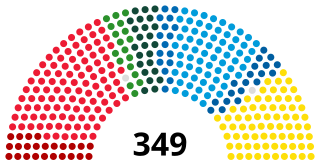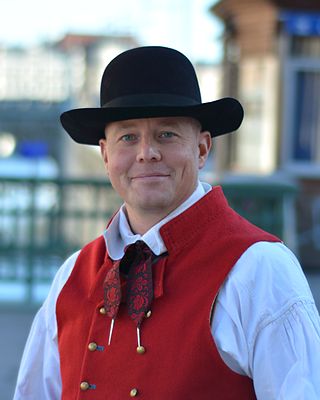
A member of parliament (MP) is the representative in parliament of the people who live in their electoral district. In many countries with bicameral parliaments, this term refers only to members of the lower house since upper house members often have a different title. The terms congressman/congresswoman or deputy are equivalent terms used in other jurisdictions. The term parliamentarian is also sometimes used for members of parliament, but this may also be used to refer to unelected government officials with specific roles in a parliament and other expert advisers on parliamentary procedure such as the Senate parliamentarian in the United States. The term is also used to the characteristic of performing the duties of a member of a legislature, for example: "The two party leaders often disagreed on issues, but both were excellent parliamentarians and cooperated to get many good things done."

The Riksdag is the legislature and the supreme decision-making body of the Kingdom of Sweden. Since 1971, the Riksdag has been a unicameral legislature with 349 members, elected proportionally and serving, since 1994, fixed four-year terms. The 2022 Swedish general election is the most recent general election.

The prime ministerof Sweden is the head of government of Sweden. The prime minister and their cabinet exercise executive authority in the Kingdom of Sweden and are subject to the Parliament of Sweden. The prime minister is nominated by the speaker of the Riksdag and is elected by the chamber by simple majority, using negative parliamentarianism. The Riksdag holds elections every four years, in the even year between leap years.

The Parliament of Finland is the unicameral and supreme legislature of Finland, founded on 9 May 1906. In accordance with the Constitution of Finland, sovereignty belongs to the people, and that power is vested in the Parliament. The Parliament consists of 200 members, 199 of whom are elected every four years from 13 multi-member districts electing 6 to 37 members using the proportional D'Hondt method. In addition, there is one member from Åland.

The speaker of the Riksdag is the presiding officer of the national unicameral legislature in Sweden.

Per Erik Gunnar Westerberg is a Swedish politician who was Speaker of the Riksdag from 2006 to 2014. He was a Member of the Riksdag from 1979 to 2014, its most senior member from 2006 to his resignation. He was Sweden's Minister for Industry and Trade from 1991 to 1994.

Early general elections were held in Sweden between 10 and 26 September 1921. In the first elections held under universal suffrage, the Swedish Social Democratic Party remained the largest party, winning 93 of the 230 seats in the Second Chamber of the Riksdag. Party leader Hjalmar Branting formed his second government.

The deputy prime minister of Sweden is the deputy head of government of Sweden. The incumbent deputy prime minister is Ebba Busch.

Kenneth Gustaf Forslund is a Swedish social democratic politician who has been a member of the Swedish Riksdag since 2002 and First Deputy Speaker of the Riksdag since 2022. Prior to taking the latter office, Forslund headed the Riksdag Foreign Policy Committee, and was the spokesperson on foreign aid and foreign policy in the Social Democratic party.

Kerstin Margareta Lundgren is a Swedish Centre Party politician. She has been a member of the Riksdag since 2002, taking up seat number 2 for Stockholm County's constituency. Since the September 24, 2018, Speaker of the Riksdag election, Lundgren was elected as third deputy speaker and serving as the current Third Deputy Speaker of the Riksdag. She is also a member of the AWEPA Governing Council.

Karin Elisabeth Svantesson is a Swedish politician of the Moderate Party. She has served as Minister for Finance in the cabinet of Ulf Kristersson since October 2022 and has served as first deputy leader of the party since 2019.

General elections were held in Sweden on 9 September 2018 to elect the 349 members of the Riksdag. Regional and municipal elections were also held on the same day. The incumbent minority government, consisting of the Social Democrats and the Greens and supported by the Left Party, won 144 seats, one seat more than the four-party Alliance coalition, with the Sweden Democrats winning the remaining 62 seats. The Social Democrats' vote share fell to 28.3 percent, its lowest level of support since 1911.

Björn Olof Söder is a Swedish Sweden Democrats politician who served as Second Deputy Speaker of the Riksdag from September 2014 to September 2018. He has been a Member of the Riksdag (SD) for Stockholm County since October 2010. He previously served as Leader of the Sweden Democrats in the Riksdag from 2010 to 2014 and Secretary of the Sweden Democrats from 2005 to 2015.

General elections were held in Sweden on 14 September 2014 to elect all 349 seats in the Riksdag, alongside elections for the 21 county councils, and 290 municipal assemblies.
The Government of the Kingdom of Sweden is the national cabinet of Sweden, and the country's executive authority.

Lotta Johnsson Fornarve is a Swedish politician for the Left Party. She was elected to the Riksdag after the 2014 general election, taking up the number 2 seat for Södermanland County constituency. On September 24, 2018, after the election of the Speaker of the Riksdag Andreas Norlén, she was elected as Second Deputy Speaker of the Riksdag. She is a former member of the municipal council in Linköping Municipality and Oxelösund Municipality.
In the 2018 Swedish general election, no political group or party won an outright majority, resulting in a hung parliament. On 9 September, the Red-Greens, led by Stefan Löfven's Social Democrats (S), emerged as the main political force in the Riksdag, while the centre-right Alliance led by Ulf Kristersson's Moderate Party only got one seat less. The right-wing populist party Sweden Democrats, led by Jimmie Åkesson, came third. As a result, protracted negotiations were required before a new government formation. On 18 January 2019, Löfven was re-elected as prime minister.

Members of Parliament in Sweden sit in the Riksdag.

The third cabinet of Stefan Löfven was the government of Sweden during 9 July 2021 to 30 November 2021. It was a coalition, consisting of two parties: the Social Democrats and the Green Party. The cabinet was installed on 9 July 2021, during a formal government meeting with King Carl XVI Gustaf. The government was the result of the aftermath of the 2021 government crisis, which saw Löfven's government removed from power in a vote of no-confidence over proposed reforms to liberalise the rent control system.

The Andersson cabinet was the government of Sweden following the resignation of Prime Minister Stefan Löfven and the hasty election of Magdalena Andersson as his successor. It was expected to be a coalition government consisting of two parties: the Swedish Social Democratic Party and the Green Party. In a late turn of events after the confirmation vote, the Green Party left the government cooperation due to the government's budget proposal failing in the Riksdag. The cabinet were originally planned to be installed on 26 November 2021 during a formal government meeting with King Carl XVI Gustaf, but Andersson decided to resign due to a precedent regarding changes in a government's composition; this happened just seven hours after the vote in the Riksdag. The Speaker then set Andersson up for a new confirmation vote to make sure she still had the Riksdag's approval.















